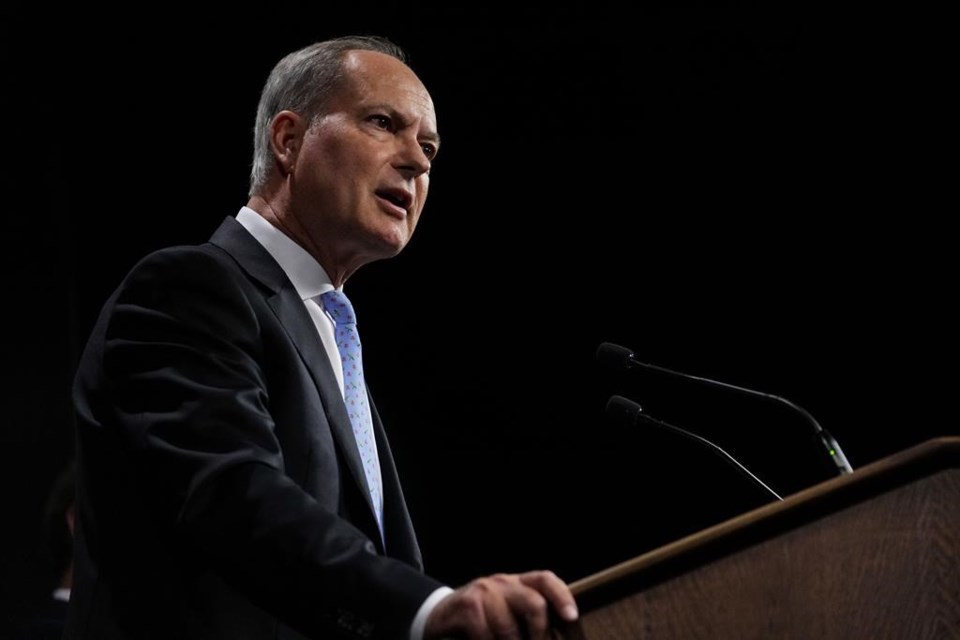TORONTO — Ontario ended the last fiscal year with a $2.1-billion surplus – a far cry from the $33-billion deficit projected in the budget – thanks to inflation and stronger economic growth, officials said Friday.
The surplus is a result of revenues that were 20 per cent higher than the 2021 budget forecast, largely coming from taxes, due to higher-than-expected inflation and nominal GDP growth more than five points higher than the average private sector forecast at the time of the budget, the government said as it released its public accounts.
Finance Minister Peter Bethlenfalvy said 2021-22 was "an extraordinary year."
"When we prepared our budget for the 21-22 fiscal year, jurisdictions around the world were still facing many unknowns, and the economic impact was still uncertain," he said at a news conference.
"We now have a clearer picture of how the pandemic impacted the economy in the previous fiscal year."
Employment grew, consumer spending was robust, and business profits saw strong gains, Bethlenfalvy said. Nominal GDP growth was 11.9 per cent, the strongest annual pace of increase since the early 1980s, he said.
Last year's surplus is not indicative of the outlook for this year, as the figures released Friday are not forward-looking, Bethlenfalvy said, but hesounded a note of optimism.
"Amid global uncertainty and with cost of living increases reaching levels not seen in decades, this surplus puts Ontario in a stronger fiscal position for the short term," he said.
The surplus is being used to help reduce Ontario's net debt, which is about $380 billion, and the government says it will pause an automatic pay increase legislators are supposed to get when there is a surplus.
NDP finance critic Catherine Fife rejected the idea that the Progressive Conservative government's fiscal management led to ending the year in a strong position, while also saying the money should be spent differently.
"This is a government that benefited from higher costs and higher wages and are taking the accolades for that," she said.
"Meanwhile, a majority of the people in this province are hurting. So it's quite a revisionism from our perspective to see a government take credit for this extra $30 billion when they could be putting key investments into the province that would actually alleviate some of the pain that people are feeling."
The government also announced an increase to the amount of money it will provide to parents in direct payment for tutoring supports from $225 million to $365 million, but still has not provided any details about how that program will work except to say applications will open next month.
"Parents play a critical role in their children's academic journey," Education Minister Stephen Lecce said. "We believe as Progressive Conservatives that parents need further support, and more direct financial support, especially amid the continued economic uncertainty."
Fife said that money should instead go toward the public education system, not private tutoring companies.
"It's a shocking disconnect, I think, that this government has from moving away from strengthening the public education system in the province of Ontario, to really putting this responsibility back to the private sector and back to parents," she said.
Actual government spending in the fiscal year that ended in March was $2.5 billion lower than the budget spending plan, including $1.4 billion lower in education, which officials say is partly due to the end of time-limited COVID-19 supports and partly due to less fundraising in schools and not as many community rentals of school space.
Health spending was higher than planned, mostly due to money that went to hospitals and long-term care homes to deal with the COVID-19 pandemic and on the vaccination strategy.
Ontario spent $75.7 billion on health last year, an increase of $6.2 billion from the previous year, including $1.8 billion for COVID-19 testing and vaccination, an additional $1.6 billion for hospitals, $1.2 billion for more health-care system usage such as doctor's visits, and $900 million for workforce supports such as $5,000 "retention" bonuses for nurses.
This report by The Canadian Press was first published Sept. 23, 2022.
Allison Jones, The Canadian Press



